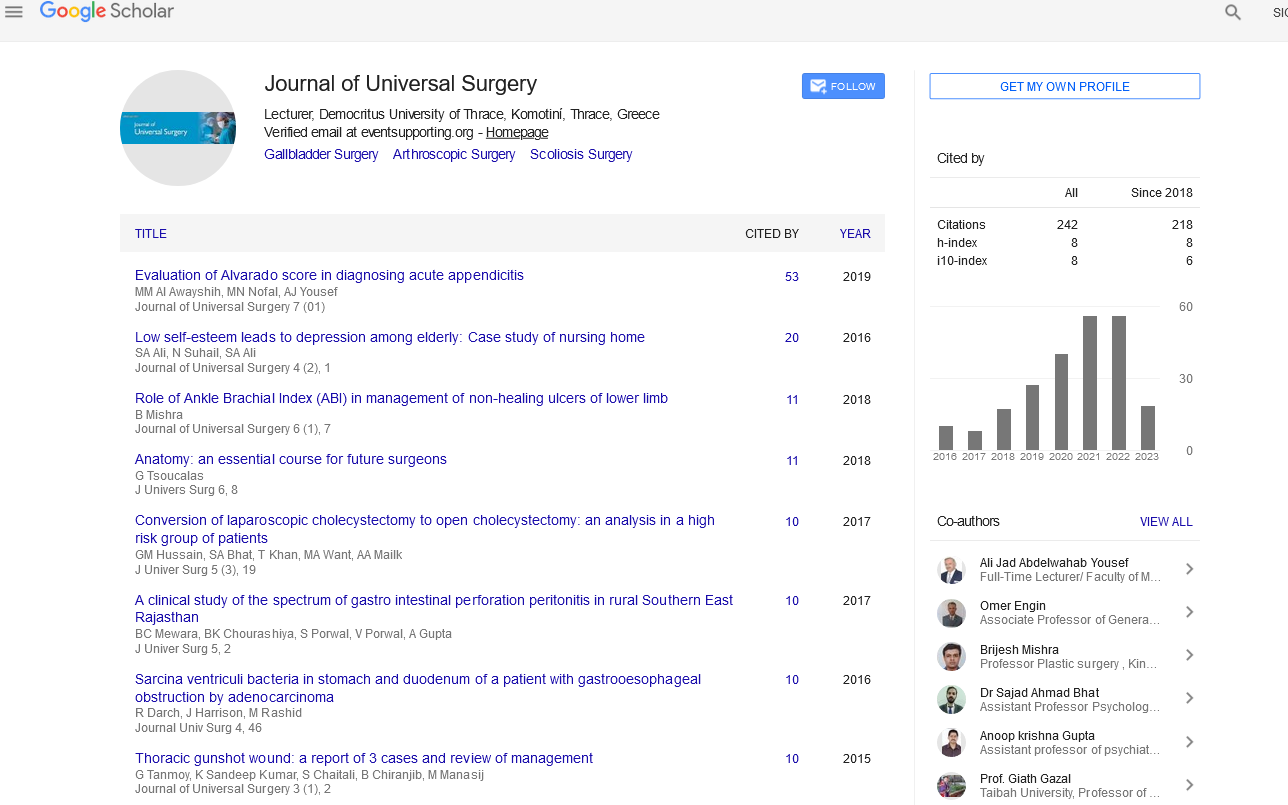Perspective - (2024) Volume 12, Issue 5
Patient Satisfaction in Implant Surgery: Key Factors and Outcomes
Masdooq Himam*
Department of General Surgeon, University of Astara, Astara, Azerbaijan
*Correspondence:
Masdooq Himam, Department of General Surgeon, University of Astara, Astara,
Azerbaijan,
Email:
Received: 25-Sep-2024, Manuscript No. IPJUS-24-15233;
Editor assigned: 30-Sep-2024, Pre QC No. IPJUS-24-15233 (PQ);
Reviewed: 14-Oct-2024, QC No. IPJUS-24-15233;
Revised: 21-Oct-2024, Manuscript No. IPJUS-24-15233 (R);
Published:
29-Oct-2024
Introduction
Implant surgery, whether it’s for dental, joint, or cosmetic
purposes, has grown in popularity as medical advancements
have improved techniques and outcomes. Patient satisfaction
plays a significant role in evaluating the success of these
procedures, as it encompasses both clinical outcomes and the
patient’s personal experience. Understanding patient
satisfaction in implant surgery requires an analysis of factors like
pre-surgery expectations, the skill level of the surgeon, postsurgery
outcomes, recovery process, communication between
the surgeon and patient and psychological well-being.
Description
Pre-surgery expectations
Patient satisfaction often begins with their expectations
before surgery. Many patients seek implant surgery to address
functional issues, such as improving chewing in dental implants
or mobility in joint replacement surgery, while others may have
aesthetic motivations, such as in breast augmentation or facial
implants.
The alignment between what the patient expects and what
the surgery can realistically deliver is critical. Studies suggest
that patients with unrealistic expectations are more likely to
experience dissatisfaction post-surgery, even if the procedure
itself is technically successful. Surgeons play a vital role in
managing these expectations by clearly communicating
potential outcomes, risks and limitations. The patient’s
understanding of the surgical process, the recovery period and
potential complications helps create a sense of preparedness,
which directly influences their overall satisfaction.
Surgical expertise and procedural success
The surgeon's expertise is a major determinant of patient
satisfaction. Surgeons specializing in implant procedures,
equipped with the latest knowledge and techniques, can often
deliver superior results. For instance, in dental implant surgery,
precise placement ensures better longevity and functionality,
while in joint replacement surgeries, ensuring correct alignment
leads to a smoother recovery and higher mobility.
In cases where the surgeon's expertise results in fewer
complications and better outcomes, patients tend to report
higher satisfaction. Technical success, however, is just one part
of the equation. A well-executed surgery that doesn’t match a
patient’s aesthetic desires or functional needs may still lead to
dissatisfaction. Therefore, matching the surgeon’s skills with the
patient’s individual goals is essential.
Post-surgery outcomes
Post-surgery outcomes are a significant driver of patient
satisfaction, especially when considering functional and
aesthetic factors. In dental implants, for example, patients often
gauge success based on how natural the implant feels, how well
it integrates with other teeth and its long-term durability.
Similarly, in breast implants or facial reconstructive surgeries,
patients evaluate the symmetry, appearance and how natural
the results appear.
While positive outcomes correlate with higher satisfaction,
the patient's perception of these results is often subjective. For
instance, two patients with similar technical outcomes may
report differing satisfaction levels based on personal
preferences, pain tolerance or aesthetic ideals. Thus, subjective
evaluations are an integral part of understanding patient
satisfaction.
Pain and recovery
The recovery period after implant surgery is often a crucial
phase that can shape a patient’s overall experience. Prolonged
pain, complications such as infection, or extended downtime can
lead to dissatisfaction, even if the eventual outcome is favorable.
Patients who experience minimal post-surgery discomfort and
recover quickly tend to report higher satisfaction.
Modern advancements in pain management and minimally
invasive techniques have contributed significantly to improving
patient satisfaction. By reducing recovery time and
postoperative discomfort, patients are more likely to feel
positive about their decision to undergo surgery. Additionally, a
well-structured rehabilitation plan, particularly in joint
replacement surgeries, helps patients regain functionality and
mobility faster, contributing to better satisfaction scores.
Communication and support
Clear and compassionate communication between the
surgeon and patient is one of the most critical components of
satisfaction in implant surgery. From the initial consultation to
the post-operative checkups, patients expect a level of care that
extends beyond the surgical procedure itself. Surgeons who
listen to their patient’s concerns, provide detailed explanations,
and set realistic expectations can greatly enhance the patient’s
experience.
Moreover, ongoing post-operative support, including followup
appointments and accessibility to the surgeon or their team
for questions, is essential. When patients feel heard and
supported throughout the recovery process, they are more likely
to express satisfaction with the overall procedure, even if there
are minor setbacks during recovery.
Psychological impact
While physical outcomes play a large role, the psychological
impact of implant surgery also weighs heavily on patient
satisfaction. Cosmetic surgeries, in particular, can have profound
effects on a patient’s self-esteem and body image. A successful
implant surgery that meets aesthetic expectations can lead to
improved self-confidence and overall mental well-being.
However, if the results don’t align with a patient’s desired selfimage,
dissatisfaction can occur. This is especially true in
cosmetic or reconstructive surgeries where the emotional
investment in the outcome is often high. Surgeons must be
attuned to the psychological needs of their patients, offering
emotional support and when necessary, referring them to
counselors or support groups.
Conclusion
Patient satisfaction in implant surgery is a multi-faceted
concept that extends beyond technical success. It involves
aligning patient expectations, ensuring a smooth recovery and
fostering clear communication throughout the process. Surgical
expertise and favorable outcomes play a significant role, but
emotional and psychological aspects are equally important. By
addressing the patient’s physical, emotional and psychological
needs, healthcare providers can enhance patient satisfaction
and improve the overall success of implant surgeries. This
holistic approach ensures that both functional and aesthetic
outcomes meet or exceed patient expectations, leading to a
more fulfilling post-surgery experience.
Citation: Himam M (2024) Patient Satisfaction in Implant Surgery: Key Factors and Outcomes. J Univ Surg Vol.12 No.5: 050.





